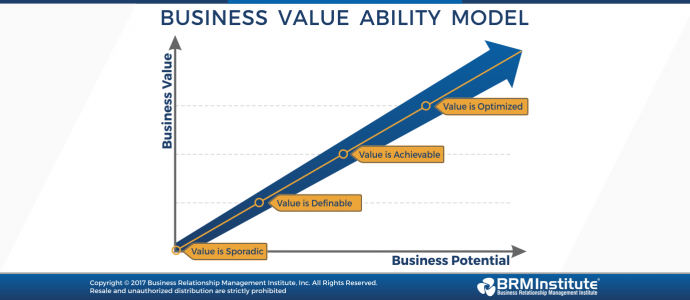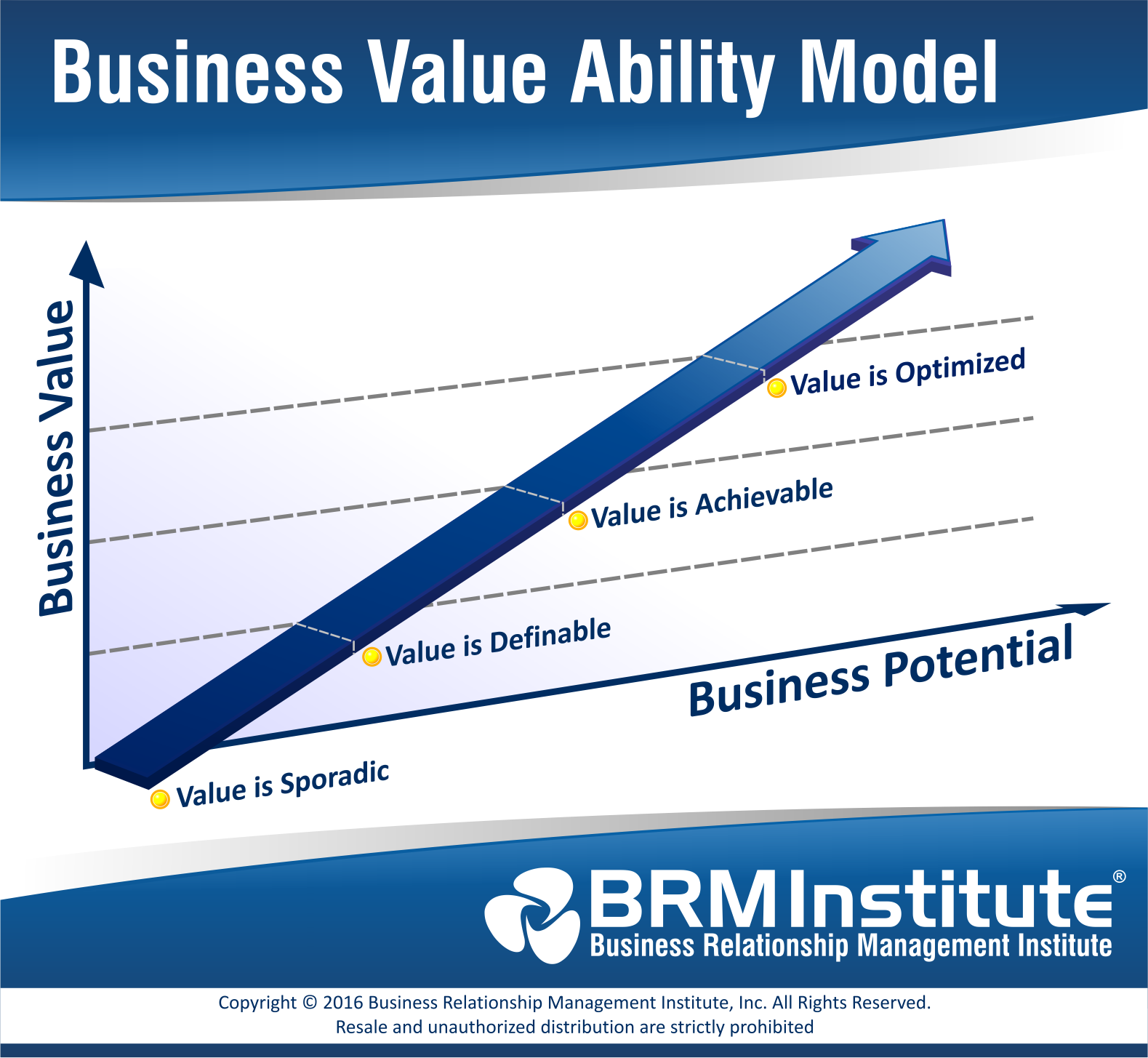CEOs, Do You Know Your Business Value Ability?

CIO: “We’ve been progressing through the playbook to improve our Business Relationship Management (BRM) capability for six months now. My CEO and CFO asked for a status update, but while I have an update on the BRM Playbook accomplishments, I’d like to give them a visual of the BRM capability’s maturity level as well. Do you have something I can use to get started, like a BRM capability maturity model?”
Me – “We sure do. However, it’s not about the maturity of your BRM capability, it’s about the business value ability that is created and realized across the organization through your BRM capability. Is your value ability “sporadic,” “definable,” “achievable,” or “optimized?” Can you define it?”
It’s not about the maturity of your BRM capability. It’s about how much business value ability the capability brings.

Business Value Ability can be positioned into four categories: sporadic, definable, achievable, and optimized. To determine where your organization resides and how much value ability you’re currently achieving, we recommend using a Business Value Ability Model.
The model focuses on the individual behaviors and organizational culture of leadership and employees.
Sporadic (Business Value Ability is Sporadic)
Culture
- Business as customers of service providers
- Strategy designed by few/inconsistent
- Top-down budgeting
Behaviors
- No formal BRM role
- Us/them attitudes
- Value is not tracked
- Delivery (go-live) is misinterpreted as value
Definable (Business Value Ability is Definable)
Culture
- Goals for strategic partnership
- Someone—unspecified—champions BRM capability
- Clear understanding of short- and long-term business strategy
- Business cases
Behaviors
- Three-to-five year business strategy documented
- BRM team budget, roles, and metrics with value targets
- Idea documents – formal ideation and prioritization processes
- Value Plans – formal Value Management process
- Business capability roadmaps
Achievable (Business Value Ability is Achievable)
Culture
- One strategy—business strategy
- Converged strategic partners
- CEO/CFO champions BRM capability
- Outside-in plans and budget
- Controlled risks
Behaviors
- Value optimized and communicated
- Shared ownership for business results
- Shared ownership for business strategy
- Routine BRM SWOTs, creating new business opportunities
- Relationship Maturity assessed and communicated
Optimized (Business Value Ability is Optimized)
Culture
- Digital Council/BRM Chair
- Customer Experience Council/BRM Chair
- Innovation Center/BRM chair
- Value stream-oriented
- Cross-organizational BRM capability
Behaviors
- Failures celebrated
- BRMs present to Board of Directors with business
- Value meetings
- Communication is everywhere
When leveraging the characteristics of each category and assessing them against your current BRM capability, it is easy to show a model of how much business value your BRM capability has the ability to bring to the organization today—along with the value ability that exists if the BRM capability is expanded upon.
Looking to further enhance your BRM capability? Join us at BRM Institute as a Professional Member to learn more.
Aaron Barnes is an expert BRM leader and practitioner with first-hand experience in successfully performing as a strategic business partner, leading BRM teams, and instilling BRM leading practices in organizations. Often referred to as the “spiritual godfather of BRM,” Aaron’s passion for business partnering come from his years of consulting service in the US and Europe leading converged business teams, designing strategy, and implementing business systems with a constant focus on delivering business value results. Aaron co-founded and is the CEO of Business Relationship Management Institute and has spent countless hours demonstrating the value of Business Relationship Management to practitioners and organizations to advance the BRM profession around the globe.
